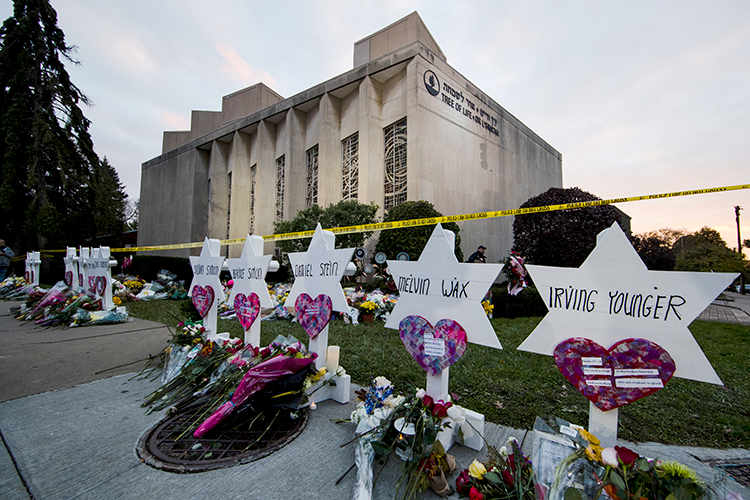People convicted of misdemeanor hate crimes should be under gun ban, ABA House urges

Mass shootings like the 2018 attack on the Tree of Life synagogue in Pittsburgh, Pennsylvania, could be prevented if violent misdemeanor hate crimes are a barrier to gun ownership, ABA House delegate Monte Frank said. (AP Photo/Matt Rourke, File)
The ABA House of Delegates on Monday overwhelmingly passed a resolution urging Congress to pass legislation that would prohibit individuals convicted of misdemeanor hate crimes from obtaining firearms.
At present under federal law, individuals convicted of felonies, including hate crimes, are prohibited from obtaining and possessing firearms, but individuals convicted of violent misdemeanor hate crimes are still permitted to obtain and possess firearms.
The Disarm Hate Act, which would include violent misdemeanor hate crimes in the the Gun Control Act of 1968, was introduced in the U.S. Senate on Sept. 13, with a companion bill introduced in the U.S. House of Representatives.
Monte Frank, a Connecticut Bar Association delegate in the House, spoke on behalf of the resolution at the ABA Midyear Meeting in Louisville, Kentucky.
With mass shootings in America, “we can either throw up our hands and offer thoughts and prayers and just accept that this carnage is part of life in America,” Frank said. “Or we can learn from these tragedies and try to find ways to prevent them from happening again.”
Resolution 603 also urges all jurisdictions to enact laws of their own prohibiting the possession, purchase and sale of firearms by individuals convicted of misdemeanor hate crimes.
“Individuals who have been convicted of hate crimes, whether felonies or misdemeanors, should not be allowed to purchase or possess firearms or ammunitions,” according to the report accompanying the resolution.
Follow along with the ABA Journal’s coverage of the 2024 ABA Midyear Meeting here.
It also recommends the creation of a system for issuing extreme risk protective orders when someone is reported as posing a danger to themselves and others, and there is documented evidence of “written or oral publication of speech expressing hatred or encouraging violence against persons because of the actual or perceived race, color, religion, national origin, gender, sexual orientation, gender diversity or disability of those persons.”
In speaking before the House of Delegates, Frank discussed the 2018 mass shooting in the Tree of Life synagogue in Pittsburgh, Pennsylvania, as an example of a tragedy that could have been prevented. Eleven people were killed, six others were wounded, and Robert Bowers was sentenced to death in August for the crime. Bowers was active on racist and anti-Semitic message boards, but prior to the shooting had only a traffic violation on his record, the New York Times reports.
Resolution 603 was sponsored by the Standing Committee on Gun Violence, the Civil Rights and Social Justice Section, the Law Student Division and the Section of State and Local Government Law.
Write a letter to the editor, share a story tip or update, or report an error.



